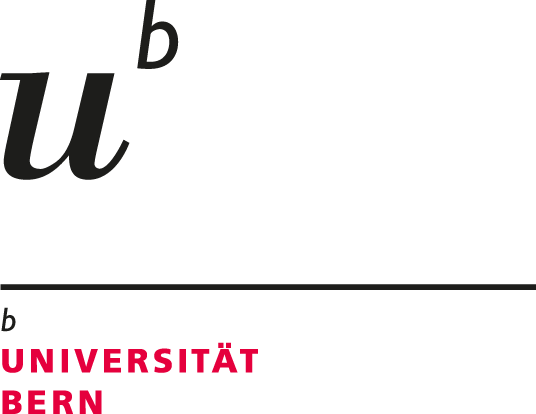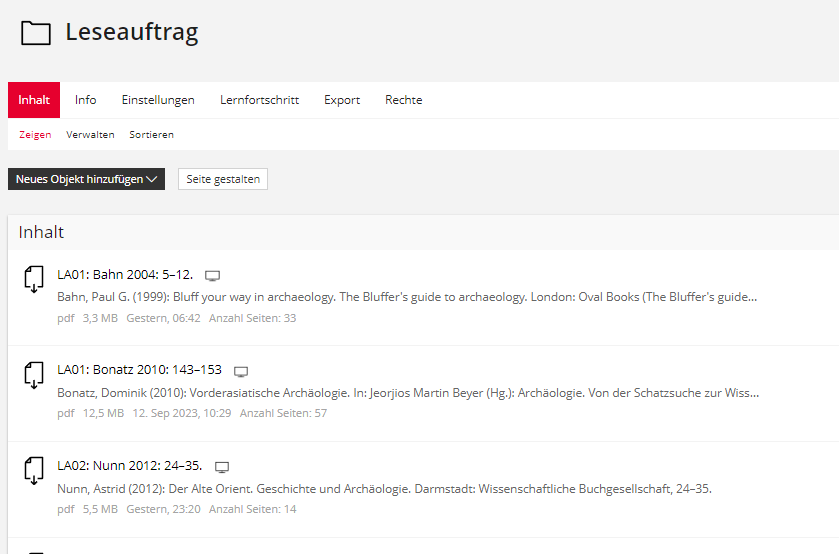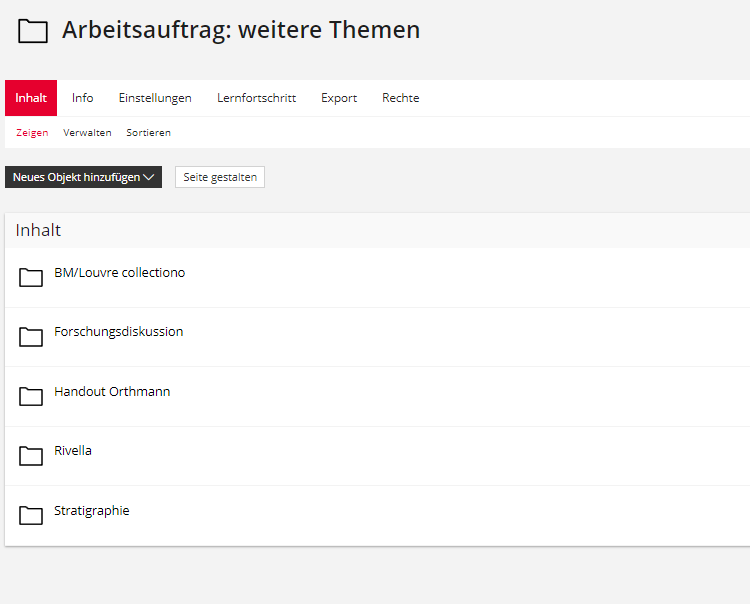in die Vorderasiatische Archäologie
Newman, John Philip (1876): The thrones and palaces of Babylon and Nineveh from sea to sea: a thousand miles on horseback. New York: Harper, 275.
01/14 (admin, Def)
Einführung
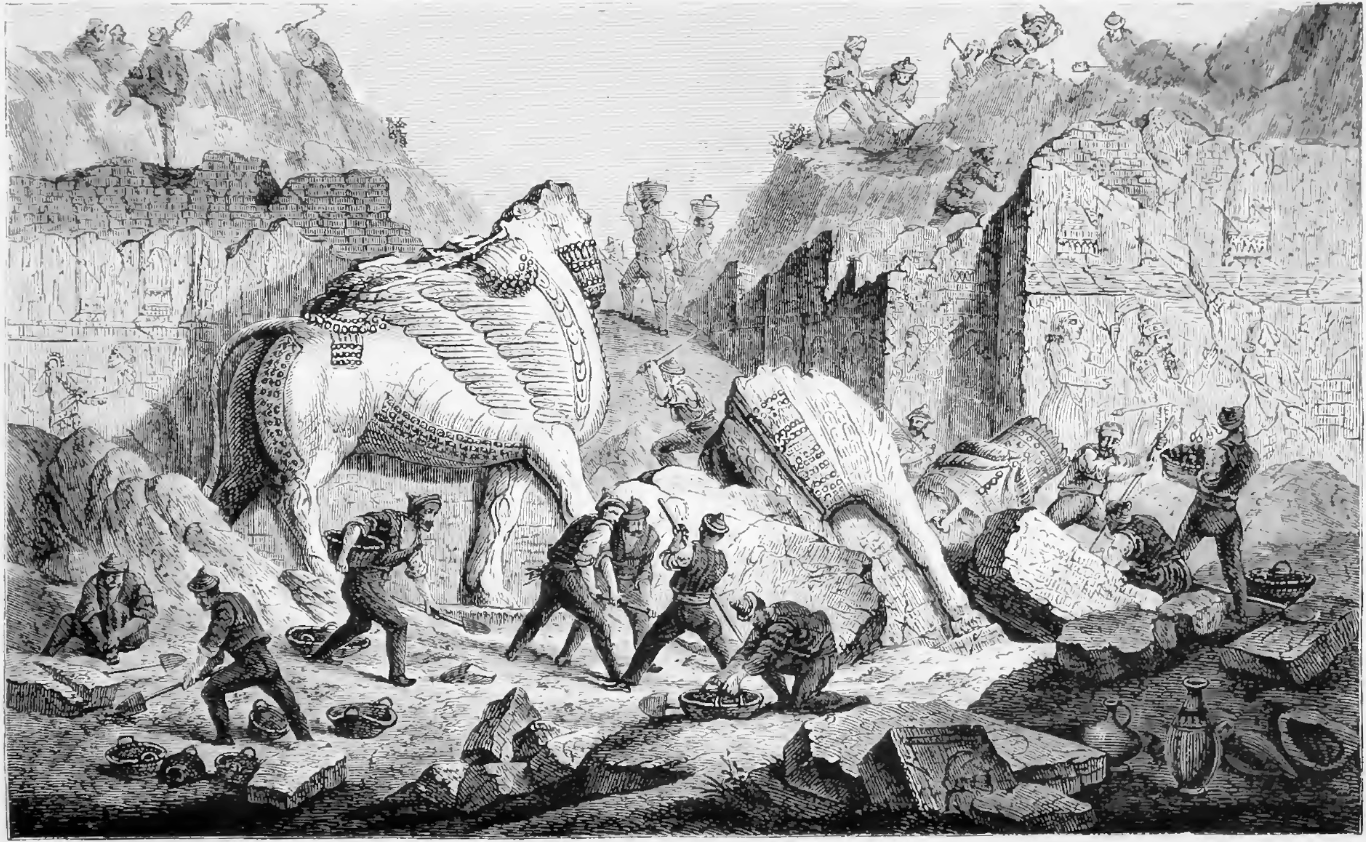
Vorstellungsrunde
Larson, G. (2003): The complete Far side, Kansas City: Andrews McMeel, Seite 643, 30.12.1986.
- Name
- Studienfächer, Schwerpunkte
- Semester
- einige Sätze zur Fächerwahl
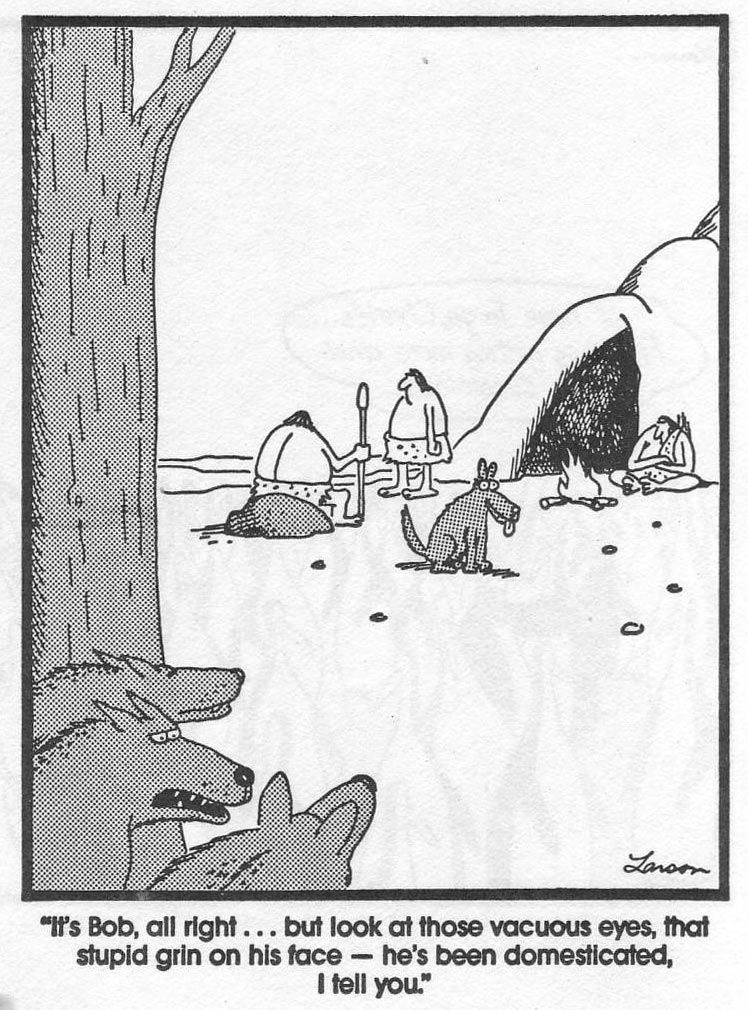
Administratives
- dienstags, 12.15–13.45 Uhr; Mit43 Raum 116
- Sprachen: deutsch und englisch
- Aufbau:
- 10 Min Besprechung/Kurzprüfung der HA
- Thema eines Zeitabschnitts, ggf. mit Kurzreferat
- Thema aus Theorie und Praxis
- ECTS: 4 (entspricht 100–120 Arbeitsstunden, diese setzen sich in etwa zusammen aus 21 h Anwesenheitspflicht, pro Woche 4 h HA = 65 h, 14 h für Prüfung lernen)
- wenn verhindert, bitte möglichst frühzeitig Bescheid geben (fatemeh.javanmardi@unibe.ch; susanne.rutishauser@unibe.ch)
- am 29. Oktober gibt es eine Bibliothekseinführung durch die UB
Daten:
16.09.2025
23.09.2025
30.09.2025
07.10.2025
14.10.2025
21.10.2025
28.10.2025
04.11.2025
11.11.2025
18.11.2025
25.11.2025
02.12.2025
09.12.2025
16.12.2025
Themen
Zeitabschnitt
-
Keramisches Neolithikum
-
Chalkolithikum
-
Frühbronzezeit
-
Mittelbronzezeit
-
Spätbronzezeit
-
Eisenzeit
Region
-
Anatolien
-
Phrygien
-
Lykien
-
Urartu
-
Elam
-
Industal
-
Zentralasien
-
Levante
-
Zypern
Theorie und Praxis
- Fachdefinition
- Museen
- Geographie
- Forschungsgeschichte
- Sprachen
- Wissenschaftliches Arbeiten
- Theorien
- Chronologie
- Handel
- Methoden
- Stratigraphie
- Belletristik
- Kulturgüterschutz
Lernziele
-
Grundlagenwerke kennenlernen
- Studierende können fünf Grundlagenwerke zur Vorderasiatischen Archäologie aufzählen
- erstes Zurechtfinden in der altorientalischen Geschichte
- Studierende können alle Hauptperioden der Vorderasiatischen Archäologie zeitlich einordnen (Jt./Jh.)
- wissen, mit welchen Informationsquellen Präsentationen vorzubereiten sind und wo diese zu finden sind
- mit dem korrekten wissenschaftlichen Arbeiten vertraut werden
Lernziele (KSL)
- Die Studierenden können die einzelnen Epochen des Vorderen Orients vom Präkeramischen Neolithikum bis zum Hellenismus benennen und diese chronologisch zu einander einordnen.
- Sie können die wichtigsten historischen Ereignisse der einzelnen Epochen wiedergeben und deren Auswirkung auf die Kultur und Gesellschaft des Vorderen Orients erklären.
- Die Studierenden können die wichtigsten Fundorte und die wichtigsten Bildwerke des Vorderen Orients der entsprechenden Epoche zuordnen und diese Zuweisung in eigenen Worten begründen.
- Die Studierenden können die Methoden der Vorderasiatischen Archäologie und die damit verbundenen Diskussionen mit vorgegebenen und eigenen Beispielen erklären und auf Fallbeispiele anwenden.
Lernplattform Ilias
blauer Rahmen um eine Abbildung/
blauer Text 🠖 Link
Ilias: Inhalt

Ilias: Inhalt, Administratives
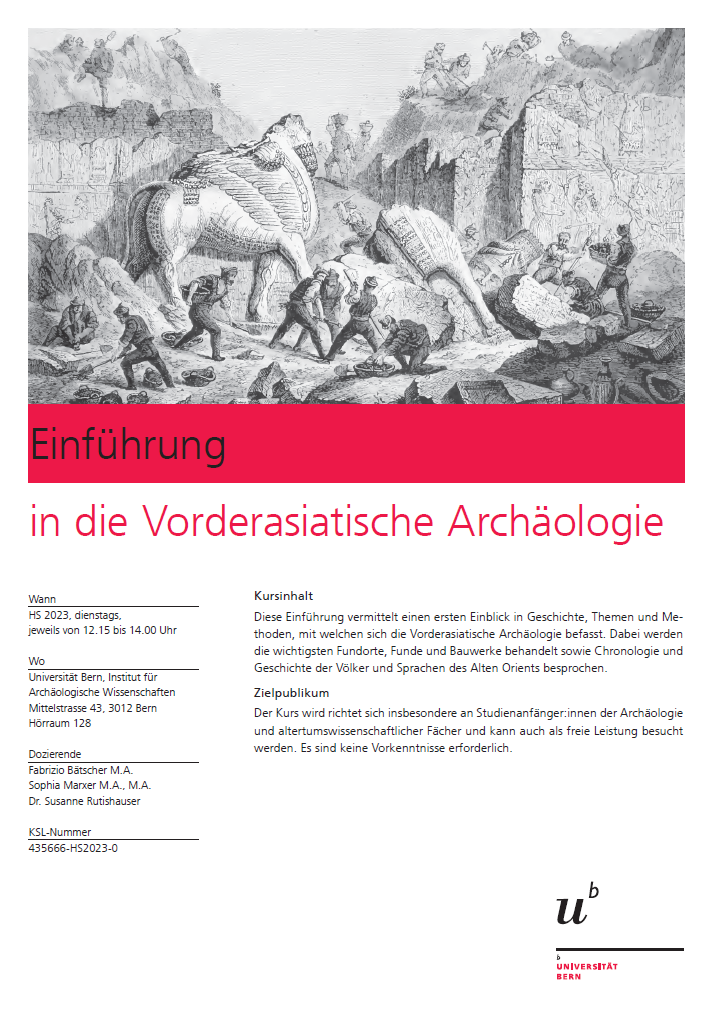
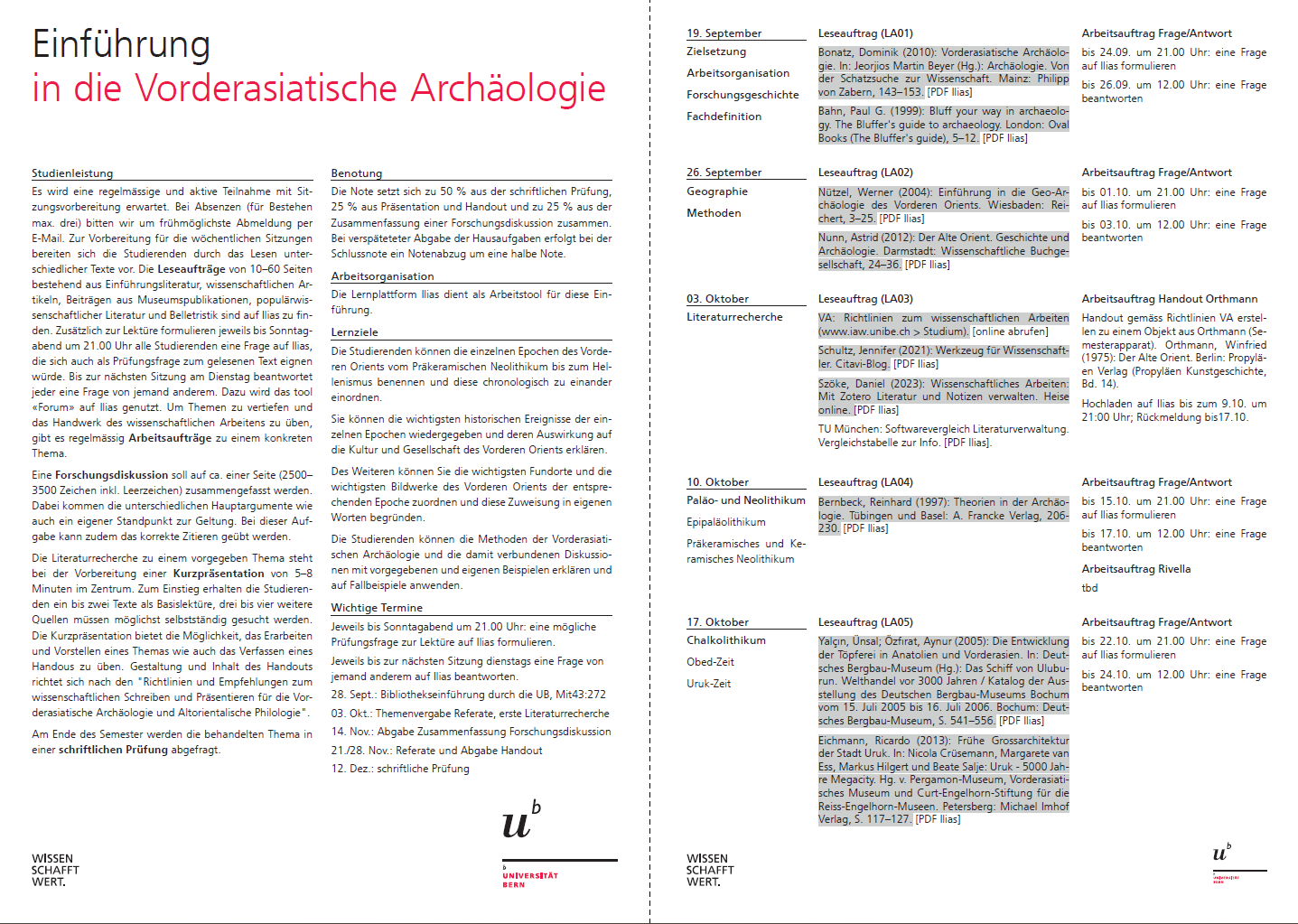
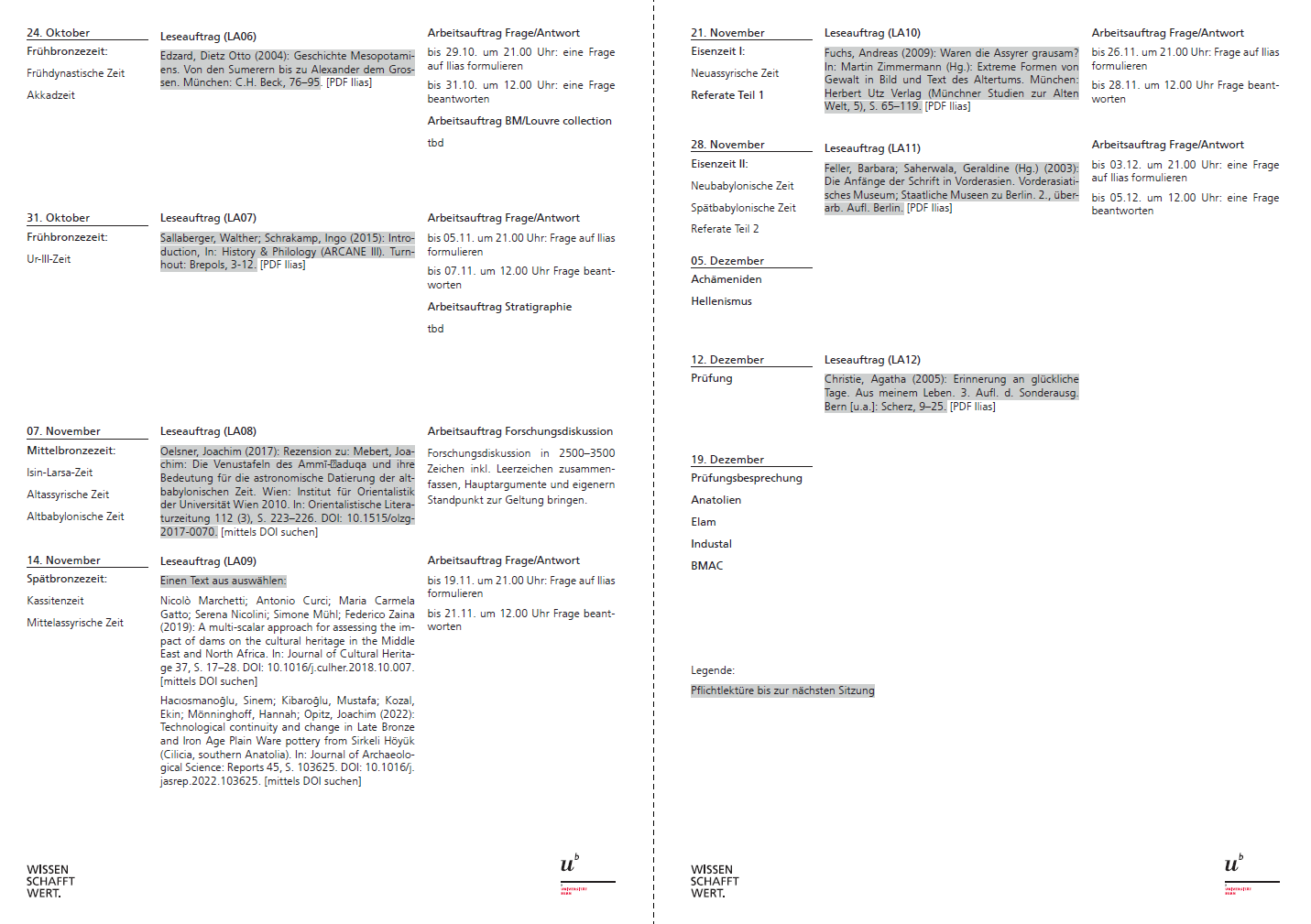
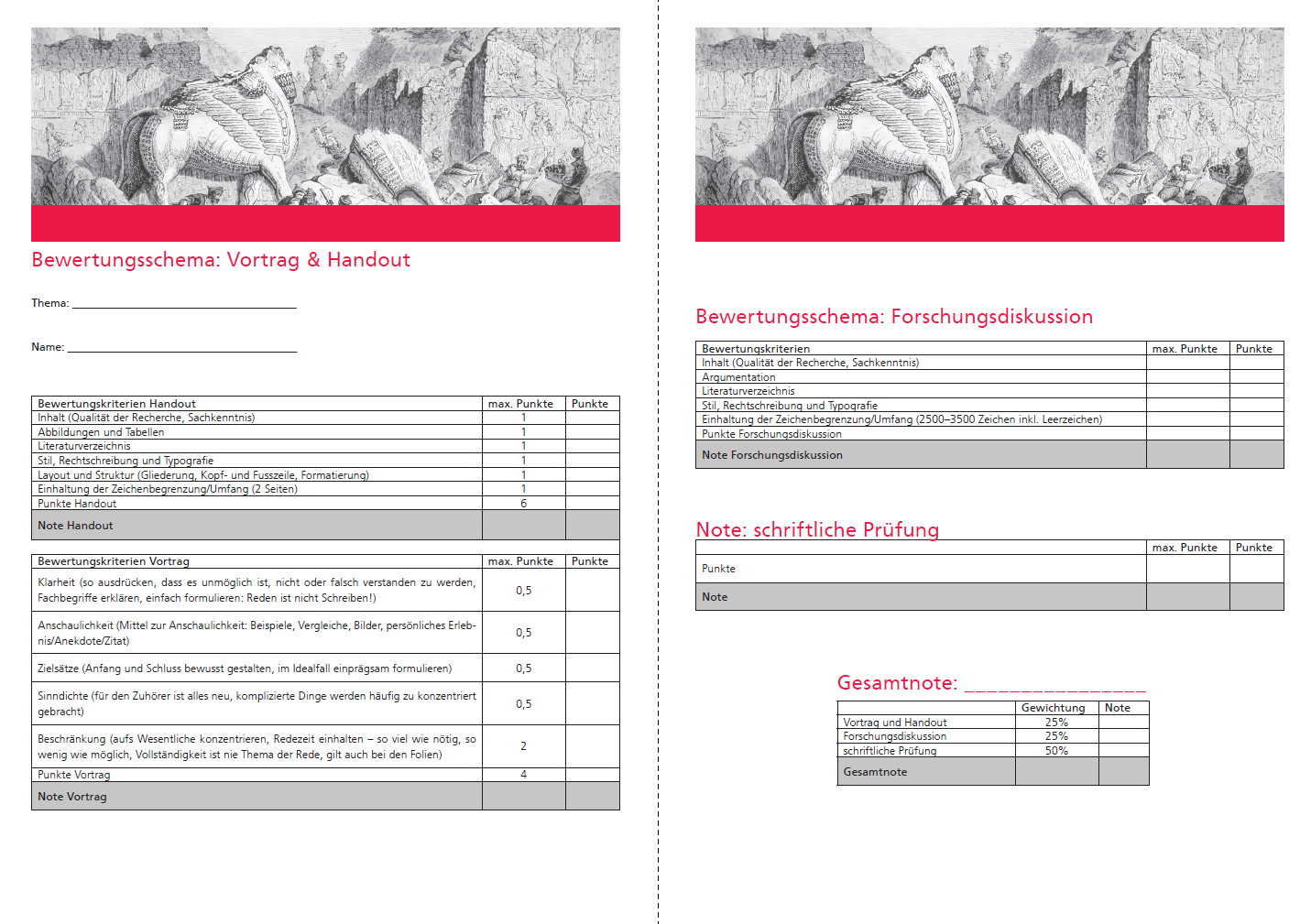
Ilias: Lektüre
Ilias: Arbeitsaufträge

Ilias: Arbeitsauftrag upload
Bewertung
- Prüfung (40%)
- Kurzpräsentation (30%)
- Kurzfragen zu den Leseaufträgen (30%) - von den 15 Leseaufträgen wird etwa die Hälfte zu Beginn der Stunde mit drei Fragen abgefragt werden. Einer der Kurztests kann am Ende aus der Gesamtbewertung ausgeschlossen werden.
Bei verspäteter Abgabe der Hausaufgaben erfolgt bei der Schlussnote ein Notenabzug um eine halbe Note.
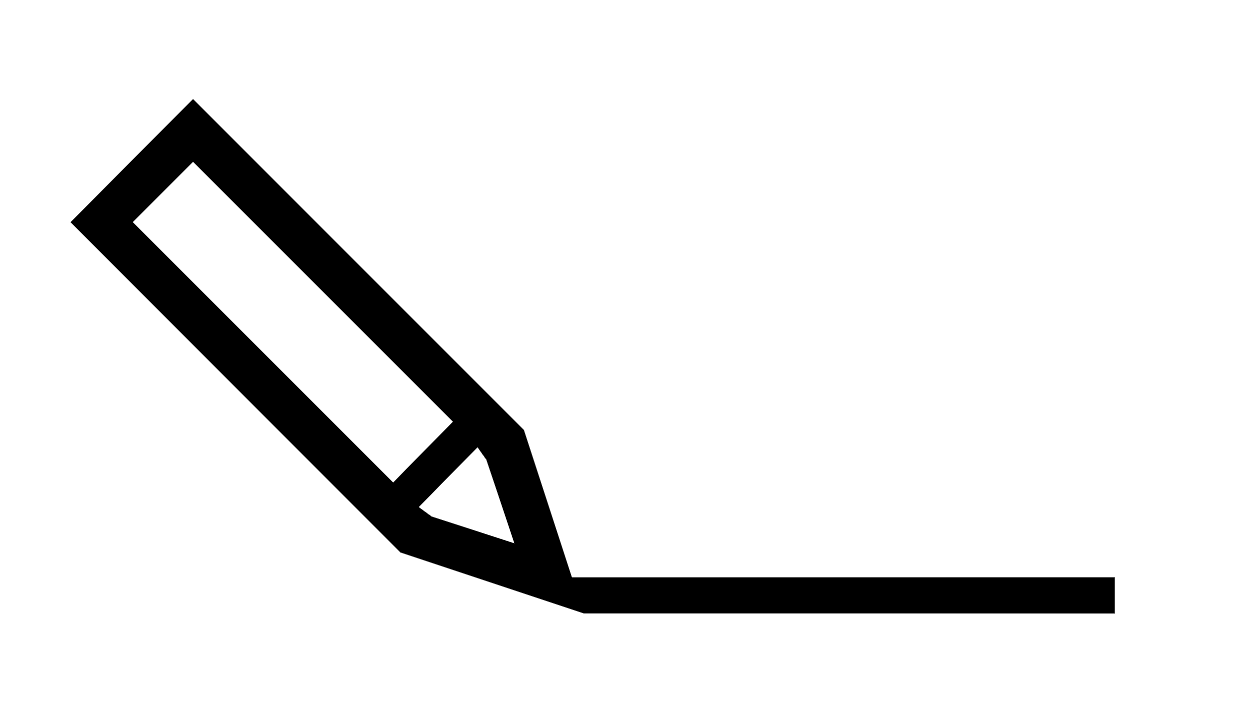
unsere Erwartungen
- regelmässige und aktive Teilnahme
- die Folien sind bewusst so gestaltet, dass sich die Studierenden Notizen machen müssen, Folien verfügen über Seitenzahlen
- welche Form der Folien erwünscht?
- Powerpoint?
- PDF?
- PDF mit Platz für Notizen?
- individuelle Vorbereitung
- abmelden, wenn verhindert
- bitte Fragen, wenn Ablauf/Hausaufgaben/Inhalte unklar sind, direkt im Unterricht oder indv. per E-Mail
Eure Erwartungen
- tbd
Definition
Wikipedia
"Archaeology (Greek: archaios, "old" and lógos, "study"; literally, "study of antiquities") is a science that uses scientific and humanistic methods to explore the cultural development of humanity. It has developed worldwide into a network of diverse theoretical and practical disciplines. Archaeology is exclusively interested in humans and their material remains, such as buildings, tools, and works of art. It covers a period from the first stone tools around 2.5 million years ago to the present day. Even the material remains of recent history (such as concentration camps and bunker lines from World War II) are now being evaluated using archaeological methods (although this approach to "contemporary history" archaeology is controversial)."
Renfrew/Bahn: Basiswissen Archäologie
"Part of the comprehensive discipline of anthropology – the study of humanity.
Physical/biological anthropology: The development of human physical/biological characteristics
Cultural anthropology/ethnology: Human culture and society
Linguistic anthropology: Linguistic varieties in relation to social factors and their temporal development
Archaeology: The culture of earlier societies, based on the material remains of their culture and their surviving written documents (if any)"
Renfrew, Colin; Bahn, Paul G. (2009): Basiswissen Archäologie. Theorie, Methoden, Praxis. Darmstadt: WBG Wissenschaftliche Buchgesellschaft.
Manfred Eggert
"By the term archaeology, I mean a science that, in a certain sense, represents the sum total of the individual archaeologies—a science, that is, that is primarily devoted to the study of the non-literate material traces of past cultures and thus makes its own contribution to the knowledge of the historical universe."
Eggert, Manfred K. H. (2006): Archäologie: Grundzüge einer historischen Kulturwissenschaft. Tübingen, Basel: Francke Verlag (UTB Archäologie, 2728).
Paul Bahn: Bluffers Guide
"If History is bunk, then Archaeology is junk. This bizarre subject entails seeking, retrieving and studying the abandoned, lost, broken and discarded traces left by human beings in the past. Archaeologists are therefore the precise opposite of dustmen, though they often dress like them. Archaeology is rather like a vast, fiendish jigsaw puzzle invented by the devil as an instrument of tantalising torment, since:
- a) it will never be finished
- b) you don‘t know how many pieces are missing
- c) most of them are lost for ever
- d) you can‘t cheat by looking at the picture.
Prehistoric persons did not always have the foresight to use materials like stone or pottery that survive the ages, and untold quantities of objects have decayed and disappeared. This is bad news for the archaeologist, but wonderful news for you..."
Bahn, Paul G. (1999): Bluff your way in archaeology. The Bluffer's guide to archaeology. London: Oval Books (The Bluffer's guide), 5.
care for some myths about archaeology?

What are the subfields of archaeology?
https://en.wikipedia.org/wiki/Subfields_of_archaeology

Are the subfields only based on time periods?
Which do archaeologists study?

Achaemenid Chariot, 5th-4th BC, Gold, Tajikistan: Takht-i Kuwad
Source: https://www.britishmuseum.org/collection/object/W_1897-1231-7?selectedImageId=23319001

Ford Transit Van, 1991, Bristol, Uk
Is that Archaeology?
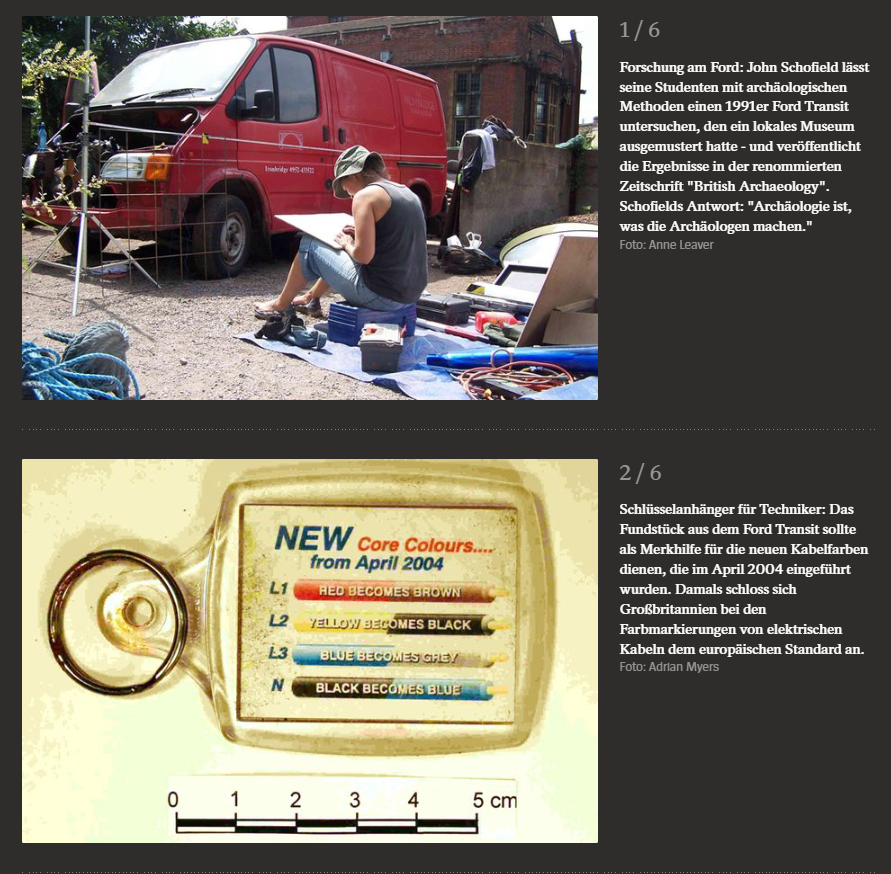
Is that archaeology?
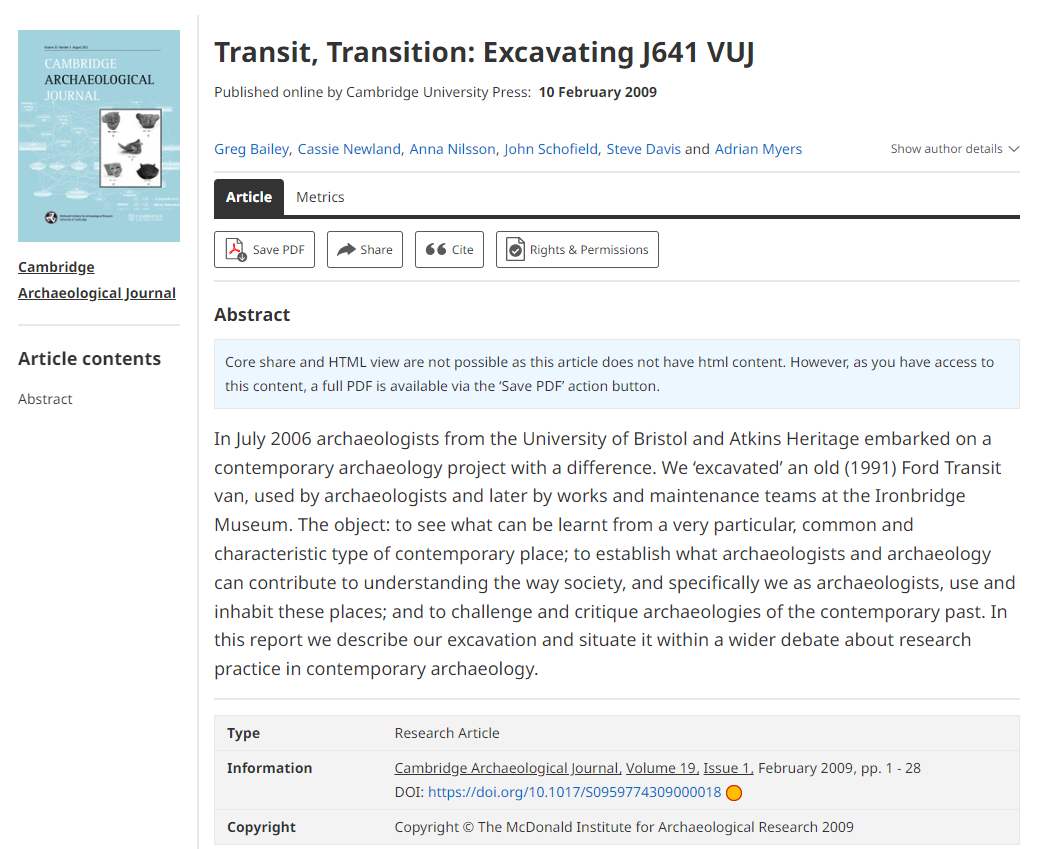
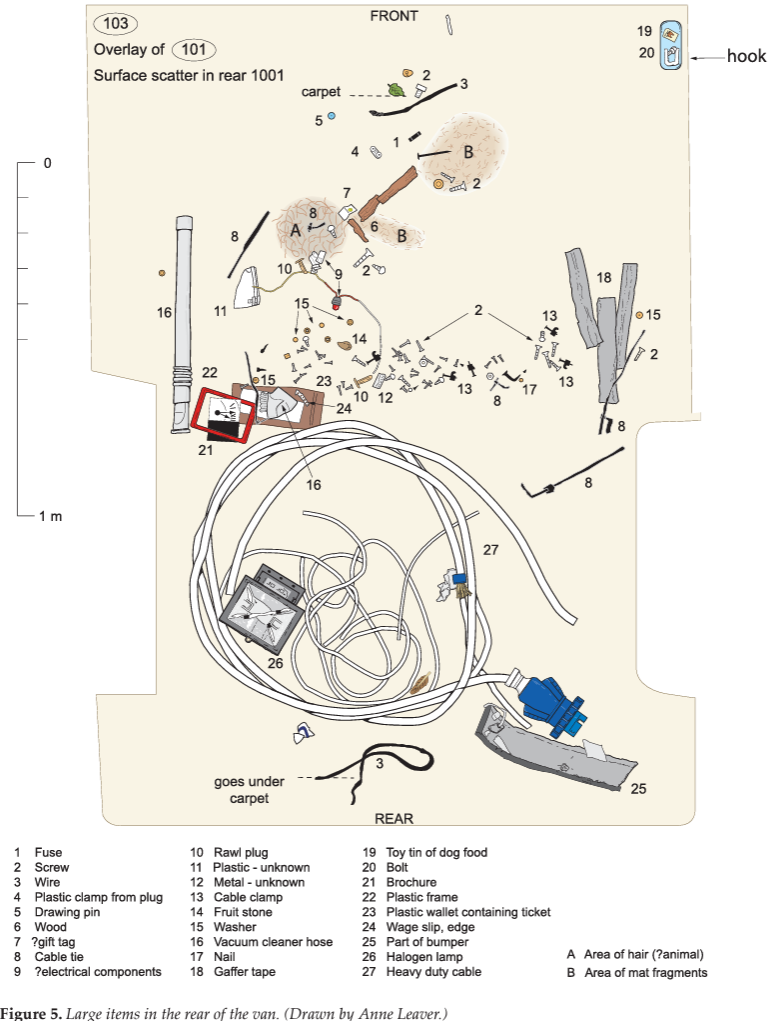
Shall we find out?

Methodology
p.2
Documentary Research
p/2
Recording
p. 3
Survey and Excavation
p.3
So is it really archaeology?

Results
p. 3
Small Finds
p.4-6
Artefacts
p. 6-9
Archaeology of Archaeologists
10-13
Conclusion
1. What is archaeology?
"Archaeology is described not just as the study of ancient remains, but as “an approach, a set of methods, ideas and perspectives which are used to investigate the past through its material remains.” It seeks understanding through material things, whether those are prehistoric settlements, protest camps, Cold War test facilities, or even a Ford Transit van"
2. What do archaeologists do?
" Archaeologists survey, excavate, record, and analyze sites and objects from both ancient and modern contexts. Their work ranges from traditional digs to projects like dismantling and studying a van used by archaeologists themselves. "
3. What do archaeologists study?
"They study the material remains of human activity — from prehistoric tools and medieval ceramics to modern industrial materials, vehicles, and even protest sites."
4. What methods do they use?
-
Survey & recording: photographing, drawing, documenting contexts.
-
Excavation: dismantling layer by layer (even vehicles have “stratigraphy”).
-
Analysis: studying small finds, environmental samples, and forensic evidence.
-
Specialist techniques: chemical analysis of dust, fingerprint analysis, and recording wear on components.
Reading Homework
- LA01: Bahn 2004: 5–27.
- LA02: Yalçın/Özfırat 2005: 541–556.
